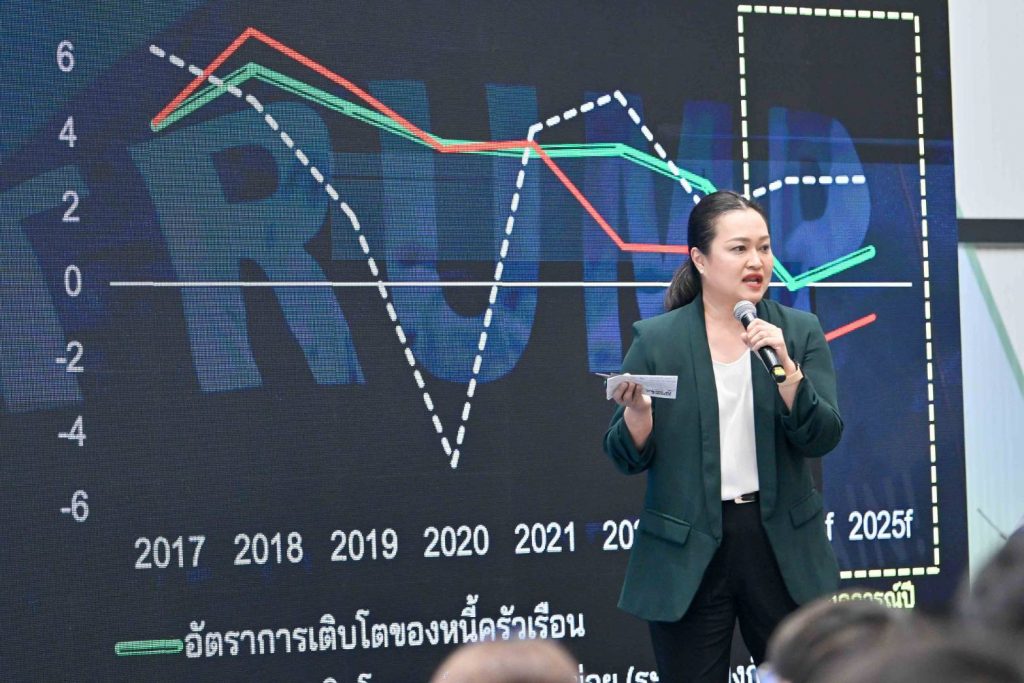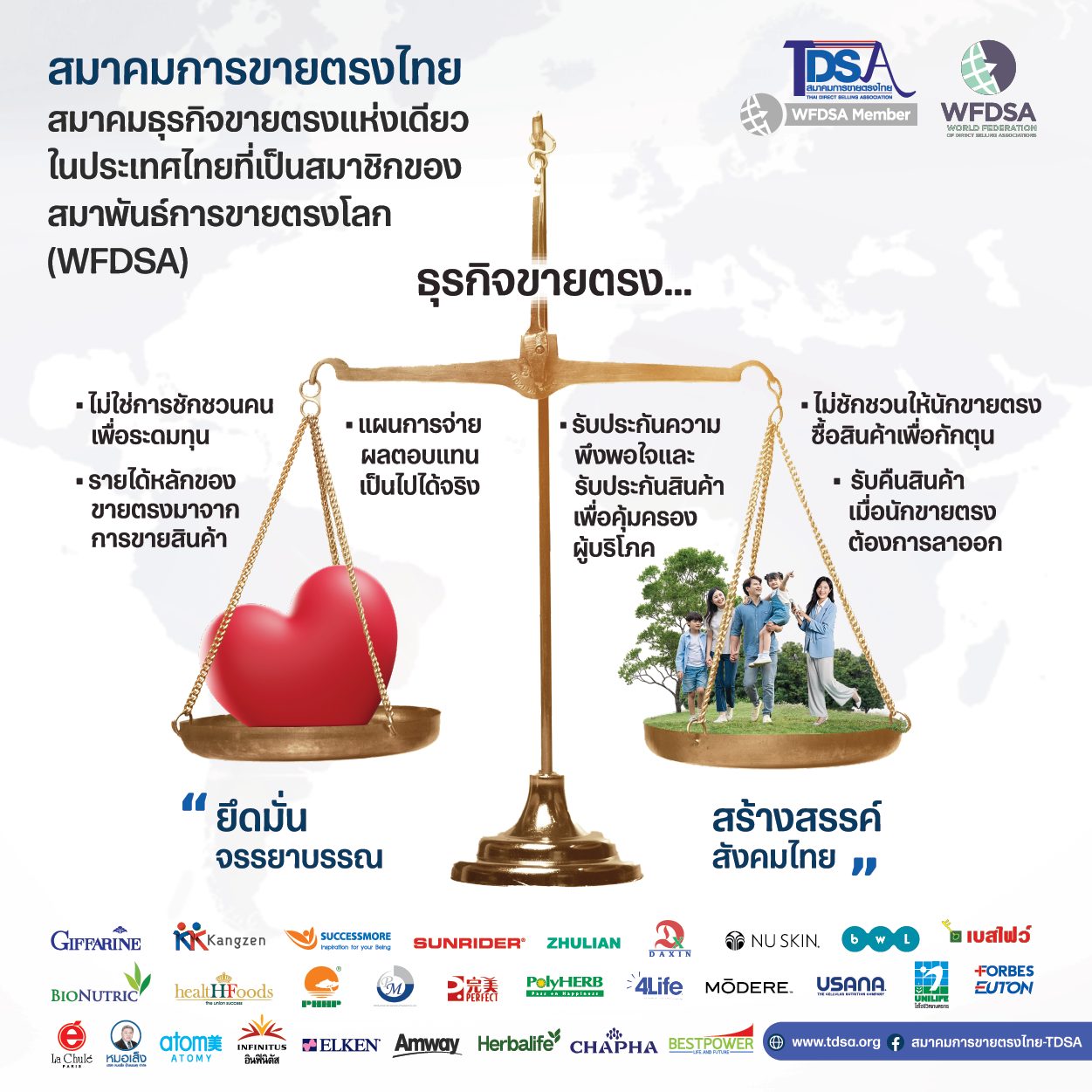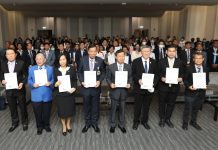
นายบุรินทร์ อดุลวัฒนะ กรรมการผู้จัดการ และ Chief Economist บริษัท ศูนย์วิจัยกสิกรไทย จำกัด กล่าวว่า การกลับมาอีกครั้งของประธานาธิบดี โดนัลด์ ทรัมป์ ได้ สร้างความไม่แน่นอนขึ้นมาต่อการลงทุนและการค้าโลก โดยเฉพาะอย่างยิ่ง นโยบายการขึ้นภาษีนำเข้าที่ต้องรอความชัดเจนในต้นปีหน้า ก่อให้เกิดความกังวล ว่า เศรษฐกิจโลกจะซบเซาเหมือนช่วงทศวรรษ 1930 นอกจากนั้น นโยบายอเมริกาเฟิร์สท์ จะทำให้มีการเปลี่ยนระเบียบโลก (Global Order) สร้างความเสี่ยงต่อองค์กรระหว่างประเทศ อย่างเช่น WTO และ NATO ได้

นางสาวณัฐพร ตรีรัตน์ศิริกุล รองกรรมการผู้จัดการ บริษัท ศูนย์วิจัยกสิกรไทย จำกัด ขยายความว่าในปี 2568 เศรษฐกิจไทยคาดว่าจะเติบโตที่ 2.4% ช้าลงกว่าปี 2567 เล็กน้อยที่คาดว่าจะขยายตัว 2.6% จากแรงส่งจากการท่องเที่ยวที่ลดลงตามจำนวนนักท่องเที่ยวที่เข้าใกล้ระดับก่อนโควิด เช่นกันกับส่งออกที่คาดว่าจะโตช้าลงจากผลกระทบสงครามการค้า ทั้งทางตรงผ่านตลาดส่งออกสหรัฐฯ และทางอ้อมผ่านตลาดอื่นๆ ที่ต้องแข่งขันกับสินค้าจีน อย่างไรก็ตาม การลงทุนภาครัฐขยายตัวดีกว่าปีที่ผ่านมาจากเม็ดเงินเบิกจ่ายงบประมาณที่ต่อเนื่อง ในขณะที่การลงทุนเอกชนปรับตัวดีขึ้นจากปี 2567 ที่หดตัว สอดคล้องไปกับ FDIs ที่เข้ามาในอุตสาหกรรมยานยนต์และอิเล็กทรอนิกส์ ทั้งนี้ ความเสี่ยงต่อเศรษฐกิจไทยยังสูง จากความแน่นอนของสงครามการค้า เศรษฐกิจหลักของโลกชะลอตัวลงโดยเฉพาะจีน และภาคการผลิตของไทยที่เจอภาวะการแข่งขันสูงจากสินค้าจีนท่ามกลางขีดความสามารถที่ลดลง

นางสาวเกวลิน หวังพิชญสุข รองกรรมการผู้จัดการ บริษัท ศูนย์วิจัยกสิกรไทย จำกัด มองว่า ในปี 2568 สถานการณ์อุตสาหกรรมไทย คงจะไม่ดีขึ้นได้มากนัก ท่ามกลางหลายปัจจัยกดดัน ทั้งสงครามการค้าภายใต้ทรัมป์ 2.0 ซึ่งจะมีผลต่อการส่งออกและการผลิต มาตรการภาครัฐบางเรื่องที่อาจกระทบต้นทุน และประเด็นเชิงโครงสร้างที่ยังทำให้การใช้จ่ายเป็นไปด้วยความระมัดระวัง ขณะที่ กลุ่มที่ยังฟื้นได้ช้า จะเป็นธุรกิจขนาดกลางลงล่าง โดยมีความเสี่ยงที่จำนวนผู้ประกอบการภาคการผลิตในธุรกิจรถยนต์ อิเล็กทรอนิกส์ เคมีภัณฑ์ โลหะ แฟชั่น อาจลดลงอีก ส่วนในภาคการค้าและบริการ แม้จำนวนผู้ประกอบการอาจเพิ่มแต่การยืนระยะทางธุรกิจก็คงไม่ง่ายเช่นกัน

ด้านนางสาวธัญญลักษณ์ วัชระชัยสุรพล รองกรรมการผู้จัดการ บริษัท ศูนย์วิจัยกสิกรไทย จำกัด กล่าวเพิ่มเติมว่า ปี 2568 คาดว่าจะยังเห็นสถานการณ์ที่แนวโน้มสินเชื่อของระบบธนาคารพาณิชย์ที่จดทะเบียนในไทยเติบโตช้าและต่ำ โดยมีอัตราการขยายตัวราว 0.6% จากปี 2567 ที่คาดว่าจะหดตัว 1.8% ท่ามกลางปัญหาหนี้ครัวเรือนสูงที่ยังจะกดดันให้สินเชื่อรายย่อยยังหดตัวต่อเนื่อง ขณะที่หนี้ด้อยคุณภาพยังเป็นปัญหาที่ต้องเฝ้าระวังต่อเนื่อง ทั้งฝั่งสินเชื่อรายย่อย รวมถึงฝั่งสินเชื่อเอสเอ็มอี โดยศูนย์วิจัยกสิกรไทยกสิกรไทย ได้วิเคราะห์ข้อมูลสินเชื่อธุรกิจ จากฐานข้อมูลบัญชีลูกหนี้นิติบุคคล ซึ่งเป็นข้อมูลสถิติที่ไม่ระบุตัวตนของเครดิตบูโร (NCB) พบ 5 ประเด็นสำคัญ คือ
- หนี้ธุรกิจไทยกลับมาถดถอยลงตั้งแต่ช่วงปลายปี 2566 ถึงต้นปี 2567 หลังหมดแรงส่งมาตรการช่วยเหลือทางการเงินช่วงโควิด
- ธุรกิจยิ่งเล็ก ปัญหาหนี้เสียยิ่งรุนแรง
- สถาบันการเงินทุกประเภทที่ปล่อยสินเชื่อเผชิญผลกระทบด้านปัญหาหนี้ด้อยคุณภาพชัดเจนขึ้น
- การเจาะกลุ่มปัญหาหนี้เรื้อรัง คือ ธุรกิจบัญชีเดิมที่เป็นหนี้ด้อยคุณภาพในช่วง 3 ปีที่ผ่านมา พบว่า ธุรกิจขนาดเล็กและกลางน่าห่วงมากขึ้น
- ประเภทธุรกิจหลักที่มีปัญหาหนี้ด้อยคุณภาพเน้นไปที่อสังหาริมทรัพย์ ค้าส่งค้าปลีก ที่พักและอาหาร และภาคการผลิต ซึ่งสะท้อนปัญหาเฉพาะหน้า อาทิ ปัญหาอำนาจซื้อของผู้บริโภคที่ลดลง การแข่งขันรุนแรง และการฟื้นตัวของธุรกิจที่ไม่กระจายทั่วถึง รวมถึงสะท้อนปัญหาเชิงโครงสร้างจากความสามารถในการแข่งขันที่ถดถอย ซึ่งจากผลสำรวจความคิดเห็นของผู้ประกอบการเอสเอ็มอี ณ สิ้นเดือนพฤศจิกายน 2567 ชี้ว่าการสนับสนุนเศรษฐกิจภาพรวมให้เติบโตต่อเนื่อง เพื่อให้เกิดผลดีต่อรายได้ของธุรกิจ จะเป็นหนึ่งในทางออกที่ยั่งยืน
KResearch projects Thailand’s GDP growth to slow to 2.4 percent in 2025 amid weaker tourism and export momentum
Mr. Burin Adulwattana, Managing Director and Chief Economist of KASIKORN RESEARCH CENTER (KResearch), said, “The return of President Donald Trump has led to heightened uncertainty in global investment and trade. Of particular concern are the proposed import tariff policies, awaiting clarification in early 2025. This development has raised anxiety about the potential for a global economic downturn reminiscent of the 1930s. Additionally, the ‘America First’ policy could disrupt the global order, posing risks to international organizations such as the World Trade Organization (WTO) and the North Atlantic Treaty Organization (NATO).
Ms. Nattaporn Triratanasirikul, KResearch Deputy Managing Director, said that Thailand’s economy is expected to grow by 2.4 percent in 2025, slightly below the projected 2.6-percent growth for 2024. This slowdown is primarily attributed to waning momentum in tourism while tourist arrivals are presently approaching pre-Covid levels. Likewise, export growth is expected to decelerate due to the trade war, which directly affects the US market and indirectly impacts other markets where Thailand competes head-on with Chinese goods. Nevertheless, public investment in 2025 is expected to post higher growth than that reported for 2024, thanks to steady budgetary disbursements, while private investment is set to improve compared to the contraction seen in 2024, in line with FDIs entering the automotive and electronics industries. However, risks to the Thai economy remain high due to uncertainties surrounding the trade war and the slowdown in major global economies, particularly China. Additionally, Thailand’s manufacturing sector may face increased competition from Chinese products amid eroding competitiveness.
Ms. Kevalin Wangpichayasuk, KResearch Deputy Managing Director, is of the view that situation within the Thai industrial sector may not improve significantly in 2025 amid several downside risks, including the potential trade war under Trump 2.0, which may hurt exports and production. Additionally, certain government measures are likely to affect costs, while structural issues may cause consumers to be more careful about their spending. Meanwhile, the sectors that will recover more slowly are small to medium-sized businesses, with the risk of a decline in the number of manufacturers in industries such as automotive, electronics, chemicals, metals, and fashion. Meanwhile, although the number of entrepreneurs in the trade and service sectors may increase, they are likely to experience challenges in sustaining their businesses.
Ms. Thanyalak Vatcharachaisurapol, KResearch Deputy Managing Director, added that loans at domestically registered commercial banks may see slower growth by approximately 0.6 percent in 2025, compared to the 1.8-percent growth projected for 2024, amid hefty household debt that continues to cause retail loan growth to shrink, while close attention must be paid to both non-performing retail and SME loans. KResearch has analyzed business loan data from the National Credit Bureau (NCB) database of corporate debtor accounts, which consists of anonymized statistical data. The analysis revealed five key findings: 1) Debt incurred by Thai businesses has declined since late 2023 to early 2024, following the end of financial relief measures introduced during the pandemic period; 2) Smaller businesses are facing more severe debt problems; 3) All types of financial institutions offering loans are experiencing more pronounced impacts from non-performing loans (NPLs); 4) A deep dive into the chronic debt (existing business accounts with NPLs over the past three years) shows growing concerns for small and medium-sized enterprises (SMEs); and 5) Key business sectors with deteriorating asset quality include real estate, wholesale and retail trade, accommodation and food services, and manufacturing. These reflect immediate challenges such as weakened consumer purchasing power, intense competition, uneven business recovery, and structural issues like declining competitiveness. According to a survey of SME operators conducted in late November 2024, promoting sustained economic growth to generate positive effects on business income is seen as a sustainable solution.

































































